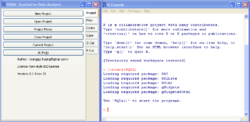RQDA
RQDA is an R package for computer assisted qualitative data analysis or CAQDAS. It is installable from, and runs within, the R statistical software, but has a separate window running a graphical user interface (through RGtk2). RQDA's approach allows for tight integration of the constructivist approach of qualitative research with quantitative data analysis which can increase the rigor, transparency and validity of qualitative research.[1]
 Main window in RQDA | |
| Developer(s) | Huang Ronggui |
|---|---|
| Stable release | 0.3-1
/ Mar 2018 |
| Operating system | Microsoft Windows, Linux, macOS |
| Type | Qualitative Data Analysis Qualitative Research |
| License | New BSD license |
| Website | rqda |
Features
In the graphical interface it has the following functions:
- Import documents from plain text
- Support non-English documents, Simplified Chinese Character is well-tested under Windows
- Support character-level coding
- Memos for documents, codes, coding, project, files etc.
- Retrieve coding, and easily gets back to the original file. Conditional retrieval is supported as well.
- Single-file (*.rqda) format, which is basically the SQLite database
- Categorize codes (tree-like categories are avoided)
- Categorize files
- Search files by keywords and can highlight keyword in the open file
- Show attributes of files, which is useful for content analysis
- Categorise cases and related attributes of cases (to bridge qualitative and quantitative research)
- Search information about selected cases from the web
- Rename files, codes, code categories, cases etc.
- Write and organize fieldwork journals
Through use of R functions, it can:
- Import a batch of files
- Calculate the relation between two codings, given the coding indexes
- Give a summary of coding and inter-code relationship.
- Export file/case attributes and show subset of files/cases.
- Allow for more flexible conditional retrieval.
- Boolean operations of and, or and not.
gollark: It's a shame the new battery technologies never seem to actually... be deployed anywhere.
gollark: Wouldn't 50% year-on-year growth starting from 1 megacars now put them at more than 20 million in 2030?
gollark: How many cars per year do they have now?
gollark: Good for them, I suppose.
gollark: Really? I heard it was worsening because China was imposing strict power limits on factories and stuff.
References
- Chandra, Yanto; Shang, Liang (2017). "An RQDA-based constructivist methodology for qualitative research". Qualitative Market Research. 20: 90–112. doi:10.1108/QMR-02-2016-0014.
External links
- Official website
- RQDA video tutorials
- Tutorial "Qualitative Data Analysis in R"
- Warner, L. (2012). Eval12 Session 682: R Qualitative Data Analysis (RQDA) Package: A Free Qualitative Analysis Tool (skill-building presentation)
- Scholarly research using RQDA
This article is issued from Wikipedia. The text is licensed under Creative Commons - Attribution - Sharealike. Additional terms may apply for the media files.